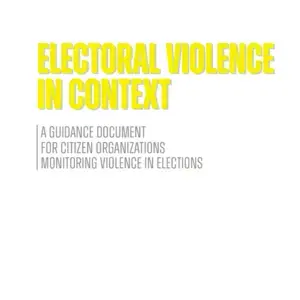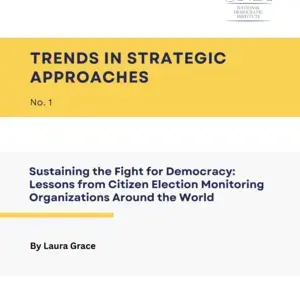NDI POLL: GEORGIANS EVALUATE PARLIAMENTARY ELECTIONS AS CALM AND ORDERLY BUT HAVE MIXED EXPECTATIONS OF NEW PARLIAMENT
TBILISI – Poll results released today by the National Democratic Institute (NDI) and CRRC Georgia reveal that the majority of Georgians expressed confidence in the electoral process and evaluated the parliamentary elections as calm and orderly. The vast majority of voters knew where to cast their ballots (92 percent), and said the process was safe (96 percent), well-ordered (96 percent), and election officials were well-prepared (92 percent).
Comparing the 2012 and 2016 parliamentary elections, most Georgians felt there was little or no violence and intimidation in either election, although Georgian Dream (GD) supporters evaluated the 2012 as worse, while United National Movement (UNM) supporters stated there was more violence and intimidation in 2016.
Although the CEC reported that only 51.6 percent of eligible citizens actually voted in the first round of recent parliamentary elections, in the poll 74 percent reported that they did so, although this number is notably smaller (62 percent) for younger people (18-35) than for 86 percent of older respondents (56 plus). When asked about party support, 40 percent of Georgians said they felt GD was closest to them, while 10 percent identified UNM, and 3 percent each said Patriots Alliance and Free Democrats. This differs from actual voting results in which GD won 24 percent of the eligible public’s vote and UNM 14 percent.
The dominant reason for voting, for 68 percent of respondents, was “civic duty.” Of GD supporters, only 11 percent said they voted to support the party and 8 percent to support the government, while 71 percent stated they voted for civic duty. Attachment to individual majoritarian candidates did not appear particularly strong either, when only few weeks after the election, one-third of voters could not correctly name their majoritarian MP.
“A fascinating finding from this poll is that unlike in many countries where the primary motivation for voting is to either keep or change the government -- and express support for a political party, mandate, or ideology -- in Georgia it appears that voters were primarily motivated by obligation for participation rather than strong favorability toward a particular political choice,” - said Laura Thornton, NDI senior director.
With regard to expectations about the new parliament, half of Georgians believe that MPs will serve their own interests only and 65 percent feel they will do what the party tells them to. Expectations vary considerably based on party support, with 72 percent of citizens who say GD is the party closest to them believing that the parliament will represent their interests, compared to less than 40 percent of other party supporters or unaffiliated Georgians. Similarly, with the exception of GD supporters, few Georgians believe their MPs are accessible to them, with fewer than 30 percent saying they could schedule a meeting with their representatives, and the majority of all respondents reporting that it is difficult to access the parliament building.
“While parliament has strong support and a favorable opinion from GD supporters, it is critical that the institution and its members work to represent all citizens even those that hold a more cynical view of the nation’s legislative body,” - says Thornton.
NDI surveys public opinion to help Georgian stakeholders diagnose and address issues of public concern by providing accurate, unbiased and statistically-sound data. This poll aims to capture the most relevant information to foster the development of responsive policies and governance. A wide range of leaders from across the political spectrum have reported that the polls are important to their work and encourage continued polling. The results reflect data collected from November 4 to December 4 through face-to-face interviews with a nationwide representative sample of Georgia’s adult population, excluding occupied territories, that included 3 141 completed interviews. The average margin of error is +/- 1,8 percent.
NDI’s survey work is funded by the Swedish International Development Cooperation Agency (Sida).
Contact: Diana Chachua Senior program and Communications officer Tel: +995 577 77 96 39 E-mail: [email protected]
-END-
NDI is an independent, nonprofit, nonpartisan organization working to support and strengthen democratic institutions worldwide through citizen participation, openness and accountability in government. More information is available at www.ndi.org
CRRC-Georgia is a non-governmental, non-profit research organization with a mission to promote evidence based debates on policy issues by providing reliable, up-to-date and accessible data and analysis. More information is available at http://www.crrc.ge




